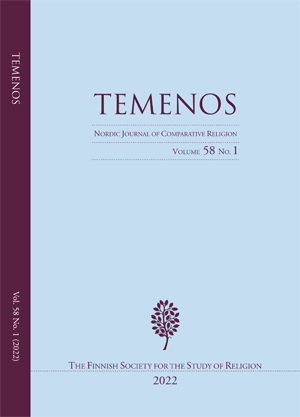Putting a Q into the Study of Religions
Observations from a Global Study with the Faith Q-Sort
DOI:
https://doi.org/10.33356/temenos.116001Keywords:
Religion, methodology, typology, family resemblance, Q methodology, Faith Q-sort, Spirituality, non-religionAbstract
The Young Adults and Religion in a Global Perspective (YARG) research project implemented a cross-cultural, comparative, and mixed-method study of religious subjectivities in twelve countries worldwide. At the core of YARG was the use and development of the Faith Q-Sort (FQS), originally designed by David Wulff (2019). The FQS is based on Q methodology and a novel method in the study. Religion as an object of study has become increasingly evasive, and the FQS met our ambition of finding sensitive ways to assess contemporary religiosity in an international perspective. This article seeks to describe the project with a specific focus on the FQS. I draw here on other publications from the project, and our use of the FQS is further exemplified by two of the main analyses we conducted: the bird’s-eye view of the shared patterns of being religious in the international sample, and the exploration of cross-cultural variations of these patterns across our country-specific cases.
Downloads
Published
Issue
Section
License
Copyright (c) 2022 Peter Nynäs

This work is licensed under a Creative Commons Attribution 4.0 International License.
Author's Guarantee
- The Author acknowledges that the Work will be publicly accessible on the Internet and that such access will be free of charge for the readers.
- The Author guarantees that the Work is her/his original work that has not been published before and cannot be construed as copying or plagiarism. Furthermore, the Author confirms that the Work contains no statement that is unlawful, defamatory or abusive or in any way infringes the rights of others.
- The Author confirms that she/he has secured all written permissions needed for the reproduction in the Publication of any material created by a third party.
User Rights
Under the CC BY 4.0 license, the Author/s and users are free to:
- Share — copy and redistribute the material in any medium or format,
- Adapt — remix, transform, and build upon the material for any purpose, even commercially,
- However, the Work must be attributed to the original Author and source of publication.
The license of the published metadata is Creative Commons CCO 1.0 Universal (CC0 1.0)
Author Rights
The Authors maintain the right to:
- copyright, and other proprietary rights relating to the Work,
- the right to use the substance of the Work in future own works,
- the right to self-archiving/parallel publishing (publisher's PDF allowed).
Rights of Publisher
- The Publisher reserves the right to make such editorial changes as may be necessary to make the Work suitable for publication in the publication, e.g. style of punctuation, spelling, headings and the like.
- The Publisher will publish the Work if the editorial process is successfully completed and reserves the right not to proceed with publication for whatever reason.
- The publication entitles the author to no royalties or other fees. This agreement will be governed by the laws of Finland.






